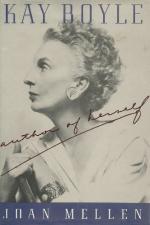|
This section contains 4,697 words (approx. 16 pages at 300 words per page) |

|
SOURCE: "Revolution, the Woman, and the Word: Kay Boyle," in Twentieth-Century Literature, Vol. 34, No. 3, Fall, 1988, pp. 322-33.
In the following essay, Clark explores the balance between literary and feminist ideology in Boyle's writing.
Modernist experiments with language have an especially problematic relationship to women's writing which is experimental. Kay Boyle's early work puts the old categories into motion and marks out a new literary space of intense descriptive prose. Yet her impact on literary history has not seemed so powerful as her writing would warrant. In 1929, Kay Boyle signed a manifesto for transition calling for "The Revolution of the Word." Other signers included Hart Crane, Harry and Caresse Crosby, and Eugene Jolas. The "Proclamation" asserted, among other things, that "The literary creator has the right to disintegrate the primal matter of words" and that "We are not concerned with the propagation of sociological ideas except to emancipate the...
|
This section contains 4,697 words (approx. 16 pages at 300 words per page) |

|


